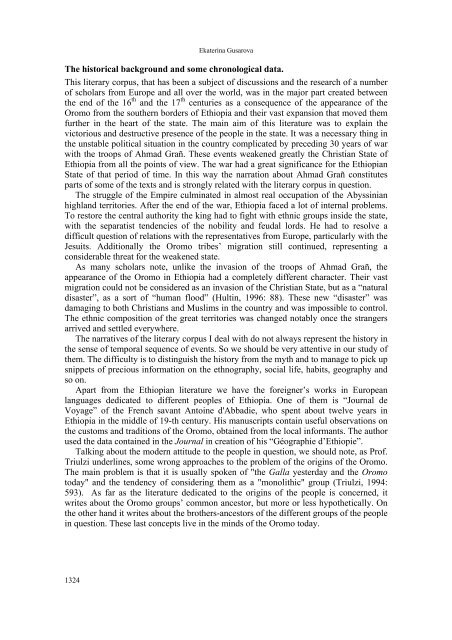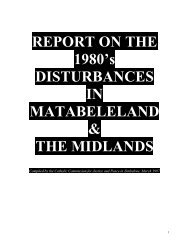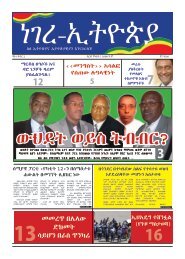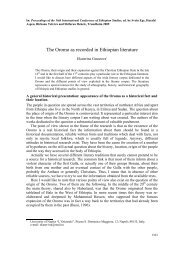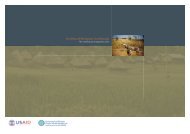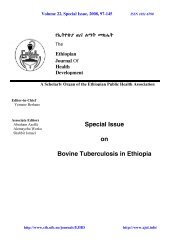Ekaterina Gusarova - The Oromo as recorded in Ethiopian literature
Ekaterina Gusarova - The Oromo as recorded in Ethiopian literature
Ekaterina Gusarova - The Oromo as recorded in Ethiopian literature
You also want an ePaper? Increase the reach of your titles
YUMPU automatically turns print PDFs into web optimized ePapers that Google loves.
<strong>Ekater<strong>in</strong>a</strong> <strong>Gusarova</strong><br />
<strong>The</strong> historical background and some chronological data.<br />
This literary corpus, that h<strong>as</strong> been a subject of discussions and the research of a number<br />
of scholars from Europe and all over the world, w<strong>as</strong> <strong>in</strong> the major part created between<br />
the end of the 16 th and the 17 th centuries <strong>as</strong> a consequence of the appearance of the<br />
<strong>Oromo</strong> from the southern borders of Ethiopia and their v<strong>as</strong>t expansion that moved them<br />
further <strong>in</strong> the heart of the state. <strong>The</strong> ma<strong>in</strong> aim of this <strong>literature</strong> w<strong>as</strong> to expla<strong>in</strong> the<br />
victorious and destructive presence of the people <strong>in</strong> the state. It w<strong>as</strong> a necessary th<strong>in</strong>g <strong>in</strong><br />
the unstable political situation <strong>in</strong> the country complicated by preced<strong>in</strong>g 30 years of war<br />
with the troops of Ahmad Grañ. <strong>The</strong>se events weakened greatly the Christian State of<br />
Ethiopia from all the po<strong>in</strong>ts of view. <strong>The</strong> war had a great significance for the <strong>Ethiopian</strong><br />
State of that period of time. In this way the narration about Ahmad Grañ constitutes<br />
parts of some of the texts and is strongly related with the literary corpus <strong>in</strong> question.<br />
<strong>The</strong> struggle of the Empire culm<strong>in</strong>ated <strong>in</strong> almost real occupation of the Abyss<strong>in</strong>ian<br />
highland territories. After the end of the war, Ethiopia faced a lot of <strong>in</strong>ternal problems.<br />
To restore the central authority the k<strong>in</strong>g had to fight with ethnic groups <strong>in</strong>side the state,<br />
with the separatist tendencies of the nobility and feudal lords. He had to resolve a<br />
difficult question of relations with the representatives from Europe, particularly with the<br />
Jesuits. Additionally the <strong>Oromo</strong> tribes’ migration still cont<strong>in</strong>ued, represent<strong>in</strong>g a<br />
considerable threat for the weakened state.<br />
As many scholars note, unlike the <strong>in</strong>v<strong>as</strong>ion of the troops of Ahmad Grañ, the<br />
appearance of the <strong>Oromo</strong> <strong>in</strong> Ethiopia had a completely different character. <strong>The</strong>ir v<strong>as</strong>t<br />
migration could not be considered <strong>as</strong> an <strong>in</strong>v<strong>as</strong>ion of the Christian State, but <strong>as</strong> a “natural<br />
dis<strong>as</strong>ter”, <strong>as</strong> a sort of “human flood” (Hult<strong>in</strong>, 1996: 88). <strong>The</strong>se new “dis<strong>as</strong>ter” w<strong>as</strong><br />
damag<strong>in</strong>g to both Christians and Muslims <strong>in</strong> the country and w<strong>as</strong> impossible to control.<br />
<strong>The</strong> ethnic composition of the great territories w<strong>as</strong> changed notably once the strangers<br />
arrived and settled everywhere.<br />
<strong>The</strong> narratives of the literary corpus I deal with do not always represent the history <strong>in</strong><br />
the sense of temporal sequence of events. So we should be very attentive <strong>in</strong> our study of<br />
them. <strong>The</strong> difficulty is to dist<strong>in</strong>guish the history from the myth and to manage to pick up<br />
snippets of precious <strong>in</strong>formation on the ethnography, social life, habits, geography and<br />
so on.<br />
Apart from the <strong>Ethiopian</strong> <strong>literature</strong> we have the foreigner’s works <strong>in</strong> European<br />
languages dedicated to different peoples of Ethiopia. One of them is “Journal de<br />
Voyage” of the French savant Anto<strong>in</strong>e d'Abbadie, who spent about twelve years <strong>in</strong><br />
Ethiopia <strong>in</strong> the middle of 19-th century. His manuscripts conta<strong>in</strong> useful observations on<br />
the customs and traditions of the <strong>Oromo</strong>, obta<strong>in</strong>ed from the local <strong>in</strong>formants. <strong>The</strong> author<br />
used the data conta<strong>in</strong>ed <strong>in</strong> the Journal <strong>in</strong> creation of his “Géographie d’Ethiopie”.<br />
Talk<strong>in</strong>g about the modern attitude to the people <strong>in</strong> question, we should note, <strong>as</strong> Prof.<br />
Triulzi underl<strong>in</strong>es, some wrong approaches to the problem of the orig<strong>in</strong>s of the <strong>Oromo</strong>.<br />
<strong>The</strong> ma<strong>in</strong> problem is that it is usually spoken of "the Galla yesterday and the <strong>Oromo</strong><br />
today" and the tendency of consider<strong>in</strong>g them <strong>as</strong> a "monolithic" group (Triulzi, 1994:<br />
593). As far <strong>as</strong> the <strong>literature</strong> dedicated to the orig<strong>in</strong>s of the people is concerned, it<br />
writes about the <strong>Oromo</strong> groups’ common ancestor, but more or less hypothetically. On<br />
the other hand it writes about the brothers-ancestors of the different groups of the people<br />
<strong>in</strong> question. <strong>The</strong>se l<strong>as</strong>t concepts live <strong>in</strong> the m<strong>in</strong>ds of the <strong>Oromo</strong> today.<br />
1324


